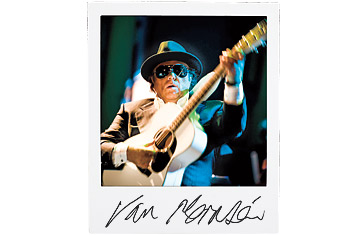
Van Morrison
People have been waiting a lifetime to hear you perform Astral Weeks live. Why did you pick this moment to finally do it? Laurie Miller, SAN DIEGO
This is the first time I've been able to do it with a full orchestra. It kept coming up over the years, and at the time, I didn't have the resources to do the full thing live. It seems like the songs are fresh now because they weren't performed very much, whereas most of my other records were done live a lot. And I don't own the original record; that's one reason. There are many, many more.
What do you like best and hate most about performing live? Rudi Obermair SCHWANENSTADT, AUSTRIA
My favorite type of audience can follow me when I start stretching out. That's the interesting thing about this live recording. You can hear it, actually, where the audience is following me. So I can open it up more rather than play songs that they know from the radio, which is something I usually do when I want to get offstage very fast.
Did you ever think songs like "Moondance" and "Brown Eyed Girl" would still be on the radio 40 years after you wrote them? Brett Tidwell, ST. LOUIS, MO.
No. "Brown Eyed Girl" I didn't perform for a long time because for me it was like a throwaway song. I've got about 300 other songs I think are better than that.
Do melodies come to you spontaneously, or do you work them out on an instrument? Philip Miller DOUBLE OAK, TEXAS
Sometimes you get the melody first. "Moondance" started out as a jazz instrumental that I'd written for saxophone. Some songs start with lyrics first and then the melody; some of them, you get both at once. "Astral Weeks" was written more spontaneously, where both sort of worked at the same time.
When will we see your out-of-print albums back in stores? Sean Nolan, ATHENS, GA.
There are no plans right now. We don't know where the record business is going, and the record companies say, "We don't know what's happening, and it's a really bad time." So if it's really bad, why would you want to do business with a record company?
Are albums/CDs still relevant? Gerald Whelan WESTMINSTER, COLO.
They're still relevant to me because I'm not a download artist. Downloads are a very small percentage of my product. But it seems the record companies all want to be the agents for downloads. And I'm not going there, so that's another reason I don't need them.
You have worked with many famous musicians. Is there anyone left you would like to do a project with? Matt Godin, BOSTON
Not really. I was doing those kinds of things more out of boredom. I'm not bored anymore, so I don't really need to do that. I'm just getting back into doing what I want to do, with handpicked musicians that I want to work with.
Are there any musicians or groups today that excite you? Terry Yarbrough BIRMINGHAM, ALA.
No. Absolutely not. It's all been done, you know?
More than any other artist, you make me think about our connection to God. Do you think of yourself as more religious or more spiritual? Kristine Bybee-Finley HURRICANE, W.VA.
Religion is a kind of word game. It's whatever it means to those individuals who are following that belief system. If you say something has got spirit or "I feel the spirit," to me, that would be more appropriate--spirit in the Aristotelian sense, that the mind and body and spirit are one thing. Which is different from religion.
How different are you today as a musician than you were 40 years ago? Tim McLemore, ATLANTA
Well, that's up to the listeners. I probably got more experienced, and I'm probably better at it than when I started. If I'd known what I know now, I wouldn't have become famous, for one thing. I didn't really have any choices, and I got put in situations where I got ripped off. I had to become something I didn't want to be just to make a living.
